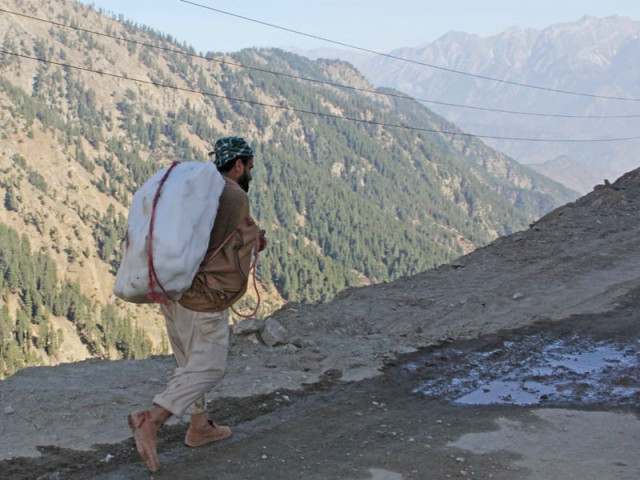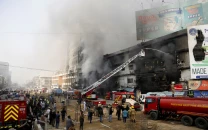On the rocks: Not the perfect harvest
Though unhealthy, the ice is an important source of income for the people of the area.

A man carries a slab of ice to be sold to dealers. PHOTO: FAZAL KHALIQ/EXPRESS
The 10,230-feet high Lowari Pass not only connects Chitral with the rest of Pakistan through Upper Dir, it is also a major source of income for locals during the summers.
Hundreds of small trucks, pickups and other vehicles carry slabs of mountain ice from the glaciers located on both sides of Lowari. However, this ice, which is widely consumed by locals, is not the healthiest of options.

Locals break ice from a glacier. PHOTO: FAZAL KHALIQ/EXPRESS
“Glacier ice is covered with dust and many other harmful particles which can cause kidney problems. Moreover, the ice is uncovered and animals walk on it leaving their waste which, when consumed, causes stomach and skin diseases,” said Dr Abdullah, advising people against its use.
On the other hand, residents of Chitral justify its consumption saying they have no other alternative of obtaining ice in this hot weather.
“It is the cheapest, most accessible source of ice in this season,” said Bahar Ali, a social activist. “Due to excessive load-shedding and low voltage, it is impossible for the freezers to work,” he added.

Though not without repercussions, glacier ice has provided livelihood to hundreds of families.
“We come here early morning to cut slabs of glaciers and sell them to dealers,” said Rahmanuddin, standing in front of the tunnel ready to start the day’s work. He explained a 2x2 feet slab sells for Rs250, an amount fixed by the men themselves.
“We collect Rs2,000 to Rs4,000 every day; sometimes even more than that,” said Rahmanuddin, adding he was satisfied with his earnings.

The same slabs are sold for twice as much in bazaars. “We take a fully-loaded truck from here and sell it in various bazaars in Chitral.
We buy ice slabs for Rs5,000 and in return make a profit of Rs3,000 to Rs4,000, which is enough for us,” said a truck driver, Ismaeel Shah, adding the revenue is usually split three ways as many people accompany one vehicle.
Published in The Express Tribune, August 2nd, 2013.



















COMMENTS
Comments are moderated and generally will be posted if they are on-topic and not abusive.
For more information, please see our Comments FAQ